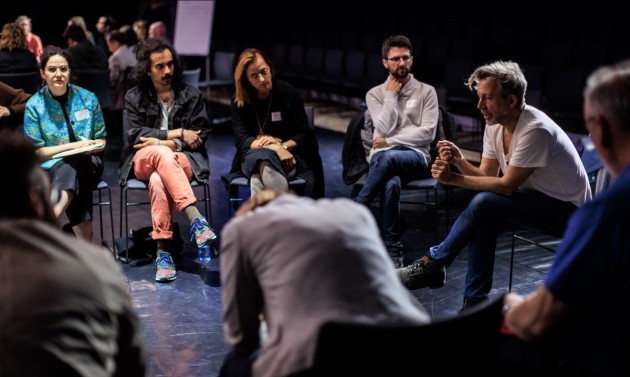The Future of European Theatre Takes Centre Stage in Opole

In May, ETC Member JK Opole Theatre hosted three major events on the future of European theatre: the ETC International Theatre Conference, the ACuTe Symposium, and the high-level European Commission event, the European Theatre Forum 2023.The future of European theatre and its relationship with the environment and digital tools were discussed in detail in Opole, Poland this month.
From 10-14 May, theatres from across the continent gathered at the JK Opole Theatre for the ETC International Theatre Conference. While in the city, ETC member theatres were invited to take part in the European Theatre Forum 2023, a major European Commission event, and in a 'Symposium' on digital practices in theatre as part of the ACuTe project.
Highlights included:
• The creation of a new ETC sustainability group of theatres to exchange on best practice and trial a green certification tool;
• An introduction to and the launch of the new ETC Study on Digital Theatre and Business Models;
• Insight into a new method of 'design thinking' for linking together theatres and technology experts;
• High-level exchange and dialogue with the European Commission about a new 'roadmap' for the theatre sector.
Speaking about the week of events, Heidi Wiley, ETC Executive Director, said: "It's rare that you get the opportunity to reflect so deeply on the most pressing themes facing our sector -- the climate crisis, the digital transition, and the importance of theatre for society. It's even rarer that you get to do this at dedicated events in the same location and with policy makers.
"We are immensely thankful to JK Opole Theatre and the European Commission for enabling us to attend these three events, which have given our membership an unparalleled insight into the needs of their colleagues in the sector around Europe."
ETC Conference
The Spring ETC International Theatre Conference began with a rich discussion on cultural and humanistic leadership, led by Dragan Šimičević, a psychologist and change manager, and a brainstorming session on ideas for new projects for ETC.
The conference was also the place to launch a new collaboration between ETC and the Theatre Green Book, initiating an applied research programme to create practical European guidance for making sustainable change straightforward and comparable in theatres. The 'ETC Theatre Green Book' will eventually become a new certification process to ensure momentum in the push to help theatres reach net zero emissions.
It will initially be trialled by a group of 9 ETC theatres from across the continent to get their theatres to 'baseline' standard across their productions, buildings and operations. These theatres will then work as ambassadors to enable sustainable change in other theatres in the network.
New ETC Members
Three new theatres joined the ETC network as full members during the conference in Opole. They are:
• Malmö Stadsteater (Malmö/Sweden)
• Teatrul Național "Lucian Blaga" din Cluj-Napoca (Cluj-Napoca/Romania)
• Tiroler Landestheater (Innsbruck/Austria)
One organisation also joined as an Associate member:
• PAV (Rome/Italy) – Associate Membership
ACuTe Symposium
While in Opole, ETC members also joined the ACuTe Symposium, an event on the latest developments in digital theatre, from 10-11 May.
The event featured a panel discussion called State of the Art – Digitality in Theatre, and a series of in-depth discussions on what theatres involved in ACuTe had learned from their own artistic digital experiments.
Two new tools were presented at the event. The first was the ETC Study on Digital Theatre and Business Models in European Theatres, which gathers data from 19 theatres in 17 countries and offers insights into digital productions, budgets, ticket sales and investments for the period 2019-21.
The second was a new design-thinking model, developed by ACuTe partner Saxion University in the Netherlands, to explain how theatres can work with emerging technologies during the design of new productions.
European Theatre Forum 2023 (11-13 May)
'Envisioning the way forward' was the title of the first-ever in person European Theatre Forum, organised by the European Commission, which took place at JK Opole Theatre from 11-13 May. Bringing together the wide European theatre sector at this major high-level event upon the invitation by the European Commission, ETC member theatres were invited alongside many other key representatives to engage and reflect on the future of European theatre.
The rich and dynamic programme of networking, panel discussions and exchange was an opportunity to collect the main needs and desires of the theatre sector, which will then be transmitted to the European Commission.
The sessions covered the broad themes of democracy and theatre, digitality in theatre, and sustainable progress in theatre. The European Commission will publish the official conclusions and roadmap for change from the event, known as the Opole Recommendations, in June and will continue the dialogue at the 'European Theatre Talks' during the Festival d'Avignon.
Georg Hauesler, Director for Culture, Creativity and Sport in the European Commission, addressed the theatre sector at the start of the European Theatre Forum. He said: "I think we all understand that culture should play a much more important role in the European project. The European project is far too driven by economy, foreign policy, money, infrastructure, which is all important. But it misses a heart. A brain. It misses something which speaks to our guts.
"This is the task for culture. I think we really need a game changer in policy of the European Union to put culture on the much higher level and to use culture as a form of integrity, in its diversity, of the European Union and European countries and beyond."
Speaking about the impact on his theatre of the week of activities, Norbert Rakowski, Artistic Director of JK Opole Theatre, said: "It was my pleasure to gather here professionals and policymakers to engage in meaningful discussions about the challenges facing the European theatre sector today.
"Our theatre, built during the times of communism in Poland when censorship was prevalent, now acts as a symbol of open dialogue and artistic freedom."